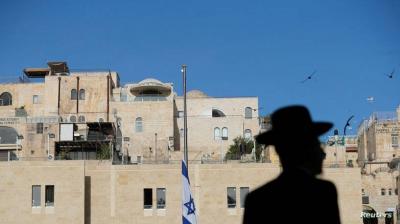The insistence on conscripting Jews from the "Haredi" community has emerged as a rare point of agreement between the government and the opposition in the ongoing war on the Gaza Strip. However, a prominent rabbi's threat to leave Israel has put the government in a new predicament. Despite the exemption from conscription for the ultra-Orthodox Jews (Haredim) since the establishment of Israel in 1948, demands for their conscription like that of other citizens have intensified, highlighting the urgent need to increase the number of soldiers amid an ongoing war with no end in sight, and the potential opening of another front on the northern border with Hezbollah in Lebanon. News of an impending Supreme Court decision mandating their conscription has triggered severe outrage among the Haredim, resulting in protests that included clashes with the police days ago.
So, who are the Haredim?
The number of Haredi Jews in Israel is approximately 750,000. They are a group of religious Jews considered to be fundamentalists as they follow religious rituals and live their daily lives according to the intricate details of Jewish law. The Haredim strive to apply the Torah in Israel.
**Origin of the Name**
The term "Haredim" is the plural of “Haredi,” which means “the devout.” It may be derived from the verb "harad," meaning anger, stinginess, and seclusion from people.
**Characteristics of Haredism**
Haredim typically wear attire that reflects Eastern European Jewish styles, such as long black coats and black hats, and they add the "tallit." Their beards are grown long and they wear sidelocks. Women often wear a burqa that closely resembles a niqab. They try to avoid speaking Hebrew as much as possible (considering it a sacred language) and prefer speaking Yiddish. Haredi families typically have large numbers of children, as they do not practice family planning, leading to a population increase compared to secular Jews who tend to delay marriage and childbirth. It is also challenging to obtain accurate information about this group regarding their numbers due to the lack of a precise definition and specific sources providing accurate statistics.
**Religious Practices**
Religiously, they adopt the most extreme interpretations of the religious heritage and strictly adhere to worship and traditions, which drives them to isolate themselves from non-observant Jews. Thus, the Haredim believe that other Jews should emulate them, as they adhere to the teachings of the Bible. They generally await the coming of the anticipated Jewish Messiah to deliver them from life's hardships and establish God's kingdom on earth, which will unite with the kingdom of heaven.
Most males in the Haredi community remain in religious schools until the age of 40, which explains their lack of participation in the Israeli workforce, resulting in poor living conditions and reliance on state support. According to Haredi beliefs, Jews are expected to withdraw from all worldly activities and focus on spiritual studies. Participation in the military, economic activities, modern literature, sports, music, films, or television is considered a sin.
Another characteristic of the Haredi community is that their population growth is the highest in Israel. Annual growth rates reached approximately 6% in 1996, 7.3% in 2000, around 6% in 2001, and about 7% in 2002, which are considered high compared to the secular Israeli community. The main reason for the population increase among the Haredim is high natural growth (approximately 72% of the total annual increase in 2001). The Haredim have about 35,000 births annually, constituting 25% of total births in Israel, and approximately 5,000 Haredi couples marry each year, with each couple having between 7 to 9 children, leading to significant population increases. In contrast, the secular population has a relatively low birth rate ranging from 1 to 1.5, with an annual growth rate of only 1.6%.
**Minority Status**
The Haredim consider themselves a numerical minority among Jews, and thus they prefer to withdraw from public life to maintain the purity of this minority group and seek to ensure its survival. Politically, they do not aspire to gain rights as a religious minority; rather, they seek to change the definition of religion and its role in life for state adoption.
**Their Political Parties**
The Haredi community is represented by several political parties based on their ethnic origins. Ashkenazi Haredim are represented by the United Torah Judaism (Yahadut HaTorah), stemming from the historical Agudat Israel and Degel HaTorah, while the Eastern Haredim are represented by the Shas party.
Yahadut HaTorah, established on the eve of the 1992 elections, secured 4 seats in the Knesset in 1992, 4 in 1996, 5 in 1999, 5 in 2003, 6 in 2006, and 5 in 2009. However, they refuse to participate in any ministerial positions, opting instead to join coalition governments through deputy minister positions or important parliamentary committees. This refusal to hold ministerial portfolios stems from their unwillingness to share political responsibility for decisions that contradict their strict religious doctrines.




